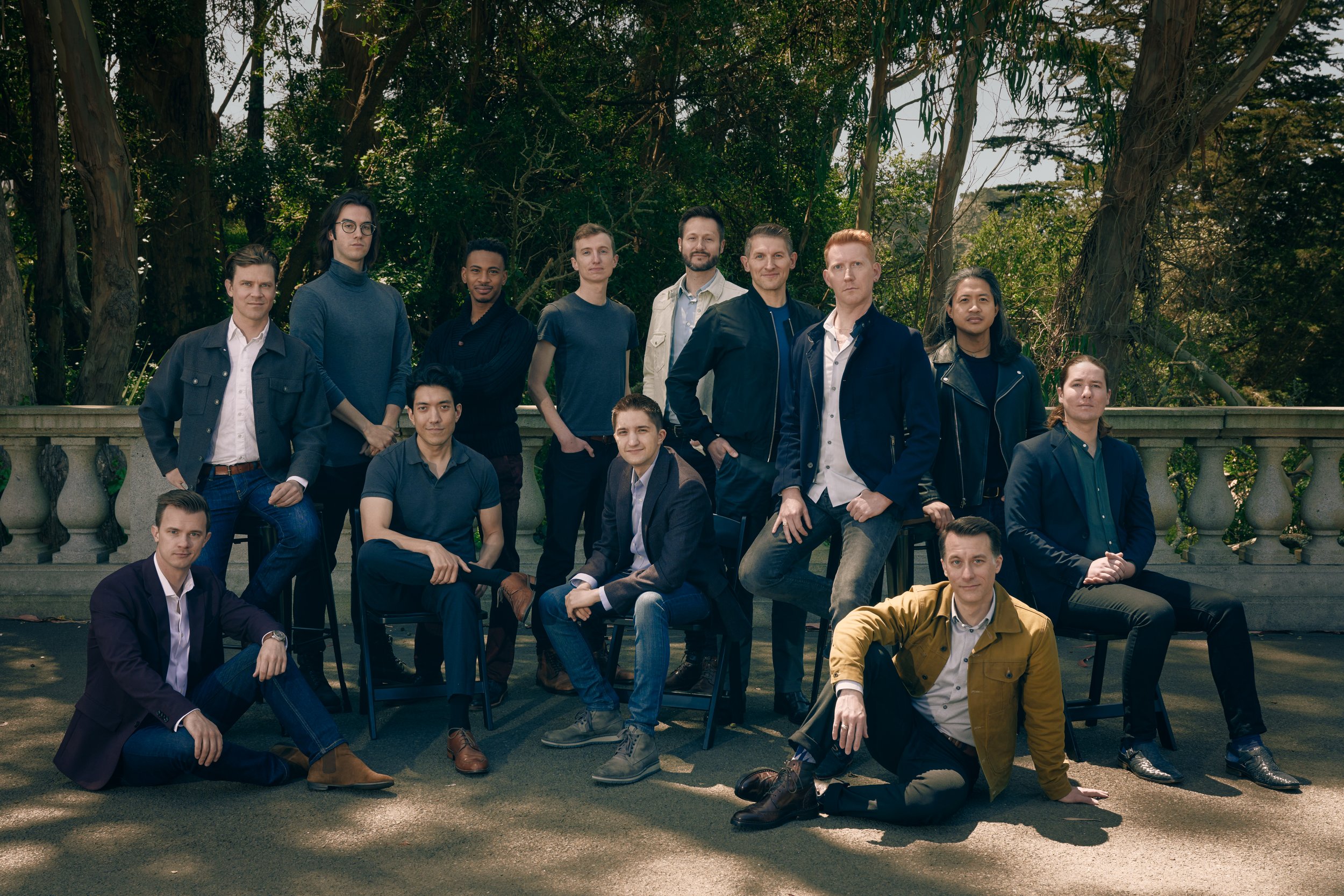Chanticleer’s Welcome Return to La Jolla’s St. James by-the-Sea with ‘Music of a Silent World’
Chanticleer, the San Francisco-based professional a cappella choir with an international reputation, made its annual midwinter concert appearance Sunday at La Jolla’s St. James by-the-Sea Episcopal Church. The twelve men on this team of spectacular vocalists handily fill the pews of the church sanctuary every visit because of their stellar artistry and their impressive repertoire of pieces commissioned by Chanticleer or specifically arranged for the capabilities of this elite ensemble.
But I suggest there is another Chanticleer characteristic that accounts for their success and their abiding audience loyalty: they sing with an incomparable urban—and urbane—joie de vivre. They sing with the visceral excitement of 8-year-olds discovering a trampoline for the first time, but their audience understands that without extensive rehearsal and preparation under Music Director Tim Keeler, none of this onstage finesse could happen. For those who have not seen Chanticleer perform, I should explain that Keeler’s work is accomplished before the tour: the men perform without a conductor.In spite of the oxymoronic sound of Chanticleer’s program title, Music of a Silent World, Keeler explains in his program notes that every aspect of the natural world—rivers, mountains, stars, trees, etc.—has something specific to communicate to us, and through poetry set to music his singers attempt to convey this communication.
The program opened with Gene Puerling’s arrangement of Kurt Weil’s song “Lost in the Stars” from his 1949 musical theater work of the same title. Using the opening phrases of the traditional spiritual “My Lord What a Mornin’” as an inviting vocal prelude, Puerling accompanies Weill’s earnest tune and Maxwell Anderson’s poignant text with close harmonies that move in parallel motion. In Jared Graveley’s arrangement of the Hoagy Carmichael American Songbook classic “Stardust” (1927), Chanticleer found another opportunity to show off its suave realization of pastel harmonies. Graveley sets Carmichael’s languid phrases with the ease we hear in early recordings of the song, but the arranger, who is also the ensemble’s sole bass-baritone, gives the full chorus a flashy finale to prove they are more than a backup group.
Did Stephen Sondheim compose a more wistful song than “I Remember” from his 1956 Evening Primrose? Music Director Emeritus Joseph Jennings’ simmering, surprisingly compelling arrangement of this understated song captures the protagonist’s anxiety of losing all the wonderful quotidian experiences they fear time will diminish, and Chanticleer communicated this emotional state with urgent eloquence.
A decade after Sondheim’s “I Remember,” Joni Mitchell wrote her anthem of existential angst, “Both Sides Now,” and Vince Peterson arranged it for Chanticleer. In the song’s opening stanza, the vocal splendor of tenor soloist Matthew Mazzola unleashed both the ardor and despair of Mitchell’s soaring melodic arcs. In the second stanza he passed the baton to his fellow tenor Vineel Garisa Mahal, who matched his passion, and the two soloists joined on he refrain. Their strong voices, aptly surrounded by mellow sonic clouds from the ensemble, provided a thrilling climax to the program’s second section.
Chanticleer offered four movements from last year’s commissioned major work The Rivers are our Brothers, a song cycle by Majel Connery inspired by the natural beauty of the Sierra Nevada mountains. I was taken by the song “I Am a River,” whose pulsing contrapuntal phrases rushed by with the force of a mighty river’s current and whose power was celebrated with a soaring countertenor solo by Bradley Sharpe. In another song from the cycle “I Am Air,” a more chordal texture was crowned by the entire countertenor section proclaiming bold, declamatory themes. Connery writes her own image rich texts, and this work was co-commissioned the ensemble Musica Sierra, an organization working in Northern California’s Sierra County.
Although Chanticleer sang only two works of early music, selecting the sacred motet “Cibavit Eos” and the love song “Innsbruck, ich muss dich lassen” by the 15th-century master composer Heinrich Isaac provided some compensation. I cannot think of an ensemble I would rather hear perform Renaissance polyphony, and Chanticleer’s “Cibavit eos,” a jubilant Psalm text, radiated spiritual ecstasy. The music of Isaac’s “Innsbruck” song is familiar today only in its sacred contrafactum known as the Passion Chorale, which can be found in almost any Protestant hymnal and which J.S. Bach used repeatedly in his two Passions. But Isaac’s original song, a swain’s farewell to the splendid city of Innsbruck and a lover who must remain there, has its own persuasive charm. Were we surprised when the singer who introduced this music compared Isaac’s song to a well-known song about Chanticleer’s home city: “I Left My Heart in San Francisco”?
Five secular German part-songs for traditional men’s chorus by the great late 19th-century composer Max Reger were scattered throughout the Chanticleer program, allowing the darker colors of his complex Romantic harmonic modulations to contrast to the more straightforward harmonic palette of music from the 20th and 21st centuries that dominated this program. The ensemble’s encore: Freddie Mercury’s “Somebody to Love.”
This concert was presented by the St. James Music Series at La Jolla’s St. James by-the-Sea Episcopal Church on Sunday, February 18, 2024.

Ken Herman, a classically trained pianist and organist, has covered music for the San Diego Union, the Los Angeles Times’ San Diego Edition, and for sandiego.com. He has won numerous awards, including first place for Live Performance and Opera Reviews in the 2017, the 2018, and the 2019 Excellence in Journalism Awards competition held by the San Diego Press Club. A Chicago native, he came to San Diego to pursue a graduate degree and stayed.Read more…


I so enjoy your comments – would love to have been there!